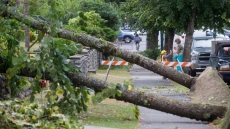The Canadian Blood Services’ Stem Cell and Marrow Network alone has over 400,000 volunteer donors registered to help patients in need.
With ground-breaking strides being made in the field of regenerative medicine, we often hear “stem cells” being used as the buzz-word to attract attention, or new potential uses being discussed. However, they already hold the key to curing numerous blood-related cancers.
Dr. Erica Harris, a survivor of a terminal cancer prognosis, recipient of both a bone marrow transplant and subsequently a double lung transplant, and an inspirational speaker has expressed “this selfless gift of gifts from a complete stranger halfway around the world once served as my lifeline of hope and survival. It has since fueled my every passion and pursuit, and is the very reason I ‘get’ to continue to be a mama to my two precious boys.”
Over 1,400 Canadian patients are currently waiting for a suitable stem cell donation to provide them with a fighting chance. The majority of patients [75%] in need of a stem cell transplant will not find a suitable genetic match within their family, but will rely on an unrelated donor. For patients with leukemia, aplastic anemia, and for more than 80 other blood-related diseases, a stem cell transplant can be the answer.
Blood stem cells are immature cells found in the bone marrow that can form any of the cells present in the bloodstream. When something goes wrong with these “baby blood cells,” a stem cell transplant from a healthy person can help replace improperly functioning cells in a patient and restore the ability to produce healthy blood cells. This only works if the donor is a close enough match, meaning the patient’s immune system or defenses to invaders do not reject the transplant. This “matching” is done by comparing protein markers that your body uses to distinguish your cells from foreign pathogens. Stem cells can be taken from the blood, or in some cases, from bone marrow in the hip area with the donor under general anesthesia. This choice is made by physicians to give the recipient the best outcome.
Patients will usually find a closer genetic match if the donor has a similar ethnic background, however, this may not always be the case. This results in important implications for patients with ethnic backgrounds that have disproportionately low representation on the registries, particularly children with “mixed ethnic backgrounds.”
This makes it crucial to ensure the stem cell registry reflects the beautiful diversity of Canadians.
Patients searching for a suitable donor are not limited to their own country’s registry thanks to an international network with 75 registries and 53 cord blood banks.
The Canadian Blood Services’ Stem Cell and Marrow Network alone has over 400,000 volunteer donors registered to help patients in need.
Community efforts led by organizations such as the One Blood For Life Foundation, of which I am the president, play a vital role in spearheading projects that invest in youth and reach out to diverse populations of donors, helping provide all patients with a better chance for a life-saving match.
The international transplant community has outlined the ‘optimal donor’ to be a young (17-35-year-old) male donor, as they provide the best possible outcomes for recipients by reducing complications such as graft vs. host disease. To become a donor, you can register online at blood.ca and a buccal swab kit will be sent to you by mail. There is no cost to sign up or donate, and you might just become a life-saving hero for a patient in need.
To contribute to this column, please email us:

ABOUT THE AUTHOR
Joban Bal is the founder and president of One Blood For Life Foundation and currently a third-year biology student at UBC. He has been named one of Surrey’s Top 25 Under 25 and has received the National ‘Honouring Our Lifeblood’ award.

